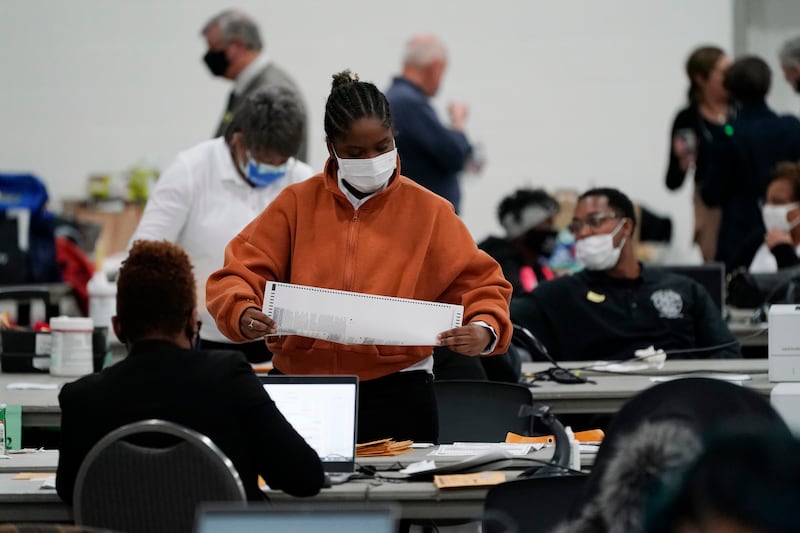Wednesday evening, as the counting of absentee ballots continued to give Joe Biden what may prove the decisive boost in the presidential race, supporters of President Donald Trump’s bid for reelection staged a demonstration outside a vote-counting center in Phoenix, Arizona, shouting, “Stop the steal!”
The rallying cry held to a line of thinking, established by Trump shortly after polls closed, that the Biden campaign and election officials were working to count illegitimate ballots. “Frankly, we did win this election,” Trump had said early Wednesday morning — even though many states hadn’t finished counting ballots. He then suggested that the counting of votes past election night — a well-established procedure — was illegal. “We want all voting to stop,” Trump said. (Voting had stopped; only the counting of votes was ongoing.)
Republican Representative Paul Gosar of Arizona was a part of Wednesday evening’s demonstration, and he echoed Trump’s argument. “We’re not going to let this election be stolen. Period,” he said.
As key states such as Pennsylvania, Arizona and Nevada remain too close to call — election officials in Pennsylvania, which could decide the race, will continue to count votes into the evening — the possibility of a protracted conclusion marked by recounts and legal challenges lingers. Here is how courts and state laws could figure into the finalizing of the election.
Recount laws
The margins remain thin as votes are tallied in a number of key battleground states: Pennsylvania, Wisconsin, Michigan, Nevada and Arizona. Each state, though, has a particular threshold for what triggers a recount, according to a ProPublica guide to election laws.
In Pennsylvania, for example, a margin of half a percentage point or less triggers an automatic recount. In Arizona, the margin is one-tenth of a percentage point. In Michigan, 2,000 votes or fewer is required; Wisconsin calls for a margin of less than one percentage point and a circumstance in which “the petitioner is informed and believes that a mistake or fraud has been committed.” The Trump campaign has requested a recount in Wisconsin, where his deficit currently stands at .6 percentage points.
In many cases, however, there are avenues to pursue a recount outside of these conditions, if a candidate can point to specific cause for concern regarding election integrity. Michigan, for example, allows a candidate who lost by any margin to appeal for a recount by alleging “a good-faith belief that but for fraud or mistake, the candidate would have had a reasonable chance of winning the election.”
Legal challenges
The legal jostling around the 2020 election began long before Nov. 3, with many lawsuits centering on voting access. But with ballots having been cast, attention now turns to lawsuits concerned with the tallying of votes.
“In all, more than 230 election-related federal lawsuits were filed from Jan. 1 to Oct. 23,” USA Today reported, “higher than any of the past three presidential election years during the same time period.” That number has since grown, with Trump’s team filing lawsuits on Wednesday in key battleground states Georgia, Pennsylvania and Michigan.
In some cases, the lawsuits have been filed by state party officials; in others, by the campaign itself. The Trump campaign and Nevada GOP officials, for example, recently filed a lawsuit to halt the counting of mail-in ballots in the state’s Clark County, arguing that they hadn’t been observed closely enough. The day before the election, a district court judge blocked their request.
The newer lawsuits in Georgia, Pennsylvania and Michigan similarly argued for closer monitoring from campaign observers, according to The Associated Press. In Michigan, a judge ruled against Trump’s campaign, while Pennsylvania a judge lessened the distance from which observers could watch ballots being counted from 20 feet to 6.
One case, filed on Tuesday, involves ballot-counting in tightly-contested Pennsylvania, where Republicans, including Rep. Mike Kelly, are accusing election officials of giving voters an improper opportunity to fix mail-in ballots that they had incorrectly filled out. Another, filed on Wednesday, alleges the counting of ineligible ballots in Georgia’s Chatham County due to improper handling of processed and unprocessed ballots by a poll worker; a judge ruled that there was “no evidence” of this.
In many cases, the numbers of votes in question is marginal. “In Georgia, the suit is about 53 ballots,” according to the New York Times, “and another case in Pennsylvania is about fewer than 100.”
University of California, Irvine, law professor Richard Hasen, has written that a specific set of conditions — such as those that arose in the 2000 Bush v. Gore election — must be met for litigation to be a deciding factor in this year’s race. The courts could play a substantial role “if there is a dispute in a state that is central to an electoral college victory and that the dispute in that state is so close (or there is such a massive failure in the election) that the election is within the margin of litigation,” he wrote Wednesday morning on his Election Law Blog. “As of this moment (though things can change) it does not appear that either condition will be met.”

